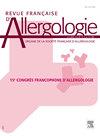Yellow mealworm (Tenebrio molitor): A rare cause of chronic urticaria
IF 0.3
4区 医学
引用次数: 0
Abstract
This report presents a unique case of chronic urticaria (CU) caused by a food allergy to mealworm. A 10-year-old boy experienced daily itchy urticarial rashes for three months, accompanied by swelling, especially in the morning. Despite high-dose second-generation antihistamines, montelukast, a hypoallergenic diet, and intermittent steroids, symptoms persisted. Routine investigations, including hemogram, thyroid function tests, and autoantibodies, were normal. Total IgE level was elevated (715 kU/L), but skin prick tests showed no sensitivities. Component-resolved diagnosis revealed a reaction to yellow mealworm (Tenebrio molitor, 0.53 kUA/L). Investigation uncovered daily bread consumption prepared from flour stored in non-heat-resistant sacks, where mealworms proliferated. Symptom resolution followed dietary elimination of contaminated flour, enabling treatment tapering. Tenebrio molitor thrives in high-temperature storage and is increasingly used as a protein source. Cross-reactivity with shrimp allergens is documented. This case highlights the role of environmental factors in CU and the utility of component-resolved diagnostics. Identifying yellow mealworm as a rare CU cause emphasizes the importance of comprehensive evaluation in persistent cases.
黄粉虫(tenbrio molitor):引起慢性荨麻疹的罕见原因
本报告提出了一个独特的慢性荨麻疹(CU)引起的食物过敏粉虫。一个10岁的男孩经历了三个月每天发痒的荨麻疹,并伴有肿胀,特别是在早上。尽管使用大剂量第二代抗组胺药、孟鲁司特、低过敏性饮食和间歇性类固醇,症状仍持续存在。常规检查包括血象、甲状腺功能检查和自身抗体均正常。总IgE水平升高(715 kU/L),但皮肤点刺试验未见敏感性。成分分辨诊断显示对黄粉虫(tenbrio molitor, 0.53 kUA/L)有反应。调查发现,人们每天食用的面包是由储存在不耐热袋子里的面粉制成的,在那里粉虫大量繁殖。在饮食中消除受污染的面粉后,症状得到解决,使治疗逐渐减少。黄粉虫在高温储存中茁壮成长,并越来越多地用作蛋白质来源。与虾过敏原的交叉反应是有记录的。这个案例强调了环境因素在CU中的作用以及组件解析诊断的效用。确定黄粉虫是一种罕见的CU病因,强调了对持续病例进行综合评估的重要性。
本文章由计算机程序翻译,如有差异,请以英文原文为准。
求助全文
约1分钟内获得全文
求助全文
来源期刊

Revue Francaise d Allergologie
Medicine-Immunology and Allergy
自引率
33.30%
发文量
349
期刊介绍:
La Revue Française d''Allergologie : un véritable forum pour faire connaître des travaux originaux et permettre la diffusion de l''information auprès de toutes les spécialités concernées par les pathologies allergiques. La Revue Française d''Allergologie (8 numéros par an) est au carrefour de nombreuses spécialités - dermatologie, pédiatrie, ORL, pneumologie, ophtalmologie, médecine interne - qui, toutes, ont à traiter des maladies allergiques. Les symptômes des allergies fondés sur des mécanismes communs sont le plus souvent associés et se succèdent chez un même patient. En forte progression depuis 20 ans, les maladies allergiques sont dans l''attente de perfectionnements et d''avancées thérapeutiques qui permettront aux nombreux patients qui en sont atteints de mieux vivre avec leurs allergies. La Revue Française d''Allergologie se veut donc un véritable forum de discussions et d''échanges entre tous les spécialistes confrontés aux pathologies
 求助内容:
求助内容: 应助结果提醒方式:
应助结果提醒方式:


